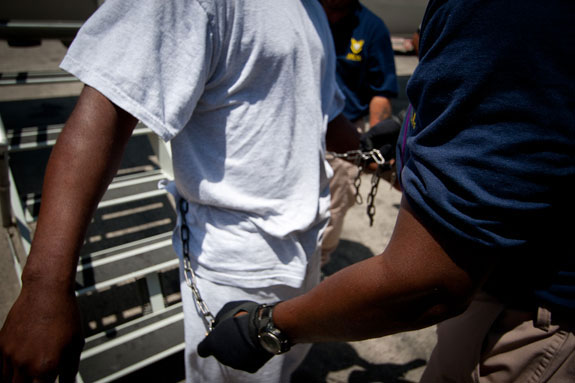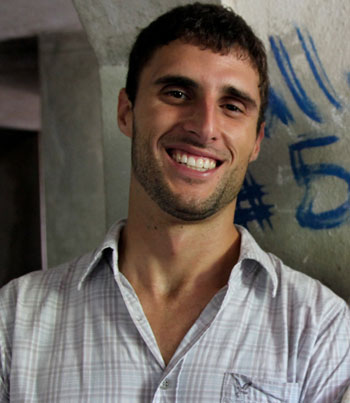
U.S. immigration agents unshackle a deportee before turning him over to the Haitian judicial police. (Photo by Jacob Kushner.)
By Trevor Aaronson
Florida Center for Investigative Reporting
After the January 2010 earthquake, journalists from around the world rushed to Haiti. They told stories of death and destruction, survival and hope, and asked how Haiti, already suffering from overwhelming health, political and infrastructure problems, could recover from this devastating natural disaster.
The question wasn’t answered. The reporters left.
With a cholera outbreak in October 2010, Haiti was again a big story — but not for long. That has been the cycle of how Haiti and many countries like it are covered. Too often, important stories go untold or unnoticed.
The story we’re publishing today is one example, and it’s being told only because a determined reporter was on the scene and asked questions.
Jacob Kushner has spent more than a year in Haiti. He moved there in August 2010, seven months after the earthquake. So when the Obama administration resumed deportations to Haiti in January, a year after the devastating earthquake, Kushner asked the right question:

Jacob Kushner
Could a country with nearly 1,000 post-earthquake camps for displaced people and only one standing government ministry building handle these new arrivals?
Kushner, a graduate of the University of Wisconsin who worked as an intern at the Wisconsin Center for Investigative Journalism, knew the country and how to go after a tough story.
“After some digging, I found that many of the deportees had only minor convictions — hardly the ‘serious criminals’ that would pose a threat to the American public, as U.S. officials claimed,” Kushner said.
One in two deportees, Kushner found, were being detained without charges in deplorable and unsanitary jail cells. A Florida deportee, 34-year-old Wildrick Guerrier, had died from what doctors described as cholera-like symptoms he developed while in a Haitian jail cell.
Kushner brought his story proposal to the Florida Center for Investigative Reporting. He needed the resources to pursue the reporting in Haiti and Florida, and we wanted to give this story broad distribution in Florida and nationally. That was the beginning of a months-long process that brought together a unique collection of partners to fund and distribute Kushner’s important story. And we hope that our readers and potential funders will see this as a model worthy of support.
We set about finding the financial support for Kushner’s reporting. The Nation Institute Investigative Fund provided a $4,000 research grant. The Investigative News Network, an association of nonprofit news organizations in the United States and Canada and of which FCIR is a member, then agreed to provide additional support to help distribute the story through its 60 member news organizations. INN gave members the option of running FCIR’s story or working with Kushner and FCIR to create localized versions.
California Watch and the Wisconsin Center for Investigative Journalism chose localized stories, providing additional funding to develop stories unique to California and the Midwest. The Canadian Centre for Investigative Reporting, which had been examining deportations from Quebec to Haiti, will use FCIR’s story as a springboard to release its own investigation, to be published in the coming weeks. As stories are published, FCIR will add links to them from our Haiti story.
Starting Nov. 13, INN members ranging from national news organizations such as the Center for Public Integrity’s iWatch News to community news sites such as the Tuscon Sentinel will also publish FCIR’s original report.
“One of the most powerful things about INN is the network’s breadth,” said Evelyn Larrubia’s, INN’s editorial director. “Members have shown they can team up to write stories of national importance rooted in communities — something few news organizations in America today still have the capacity to do.”
This investigation of deportations to Haiti also highlights the breadth of FCIR’s distribution network in Florida and elsewhere. WLRN’s Under the Sun worked with FCIR to create a companion radio story that will air this month on Florida’s NPR stations and will be posted on FCIR’s website when it’s released. The Miami Herald and community and ethnic newspapers, such as Le Floridien, a Creole- and English-language newspaper in South Florida, will publish the story, as will New America Media, representing 2,000 ethnic media organizations, and Latin American investigative news sites including Plaza Pública in Guatemala.
Through these funding and distribution partnerships, FCIR will reach a potential and diverse audience of millions.
With FCIR now in its second year as a bilingual nonprofit investigative news site dedicated to public service reporting in Florida and the Americas, we are committed to ambitious projects and new ways to finance and distribute them. You can help FCIR produce the next project by making a tax-deductible donation online.
And please let us know what you think of our journalism by commenting on the story pages or writing to me or my co-director, Mc Nelly Torres.
